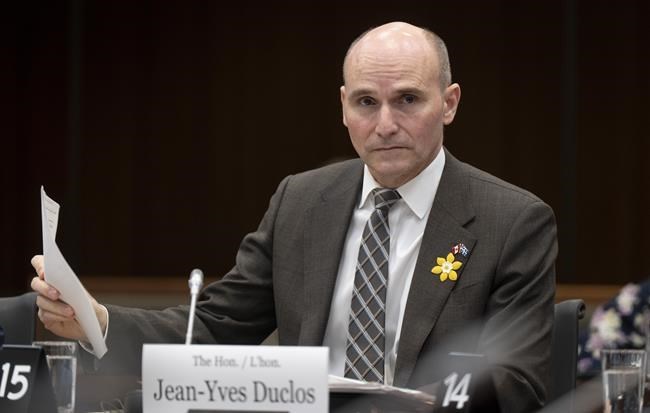OTTAWA — Health Minister Jean-Yves Duclos said Thursday he did not put any undue political pressure on the independent federal agency that regulates the price of patented drugs to influence its efforts to lower medicine costs.
Duclos defended himself against the accusation at the House of Commons health committee, which is investigating reforms to the way the Patented Medicine Prices Review Board regulates the cost of drugs.
The board has a mandate to make sure drug costs don't become excessively expensive, which includes looking at the price of similar medications in other countries.
The reforms will see the board compare Canadian drug prices to those in a wider range of countries. The changes were delayed multiple times, and finally came into force in July.
The agency was in the process of consulting on the finer details associated with the new rule in November when Duclos wrote to its acting chair and suggested the process be paused to give drug companies, patient groups, provincial ministers and himself more time to understand the changes.
"I invited the board to consider extending consultation because I felt that my colleagues at provinces and territories and patient groups and other important stakeholders needed to have more time," Duclos told the committee Thursday.
One of the agency's board members resigned shortly afterward, saying Duclos undermined the board's independence.
Duclos told the committee that while he was required by law to offer his opinion on the consultation process, the decision to pause enforcement of the new rule was ultimately up to the agency.
"I cannot interfere in the work of the board, although I follow it closely," Duclos said. "I have to be extremely careful in my relationships with the board."
But NDP health critic Don Davies, who initiated the committee's study, accused the minister of halting the implementation of a new rule intended to lower the cost of drugs at the behest of drug companies that have resisted the change.
"We hope to find out why the Liberals are standing with the multi-billion dollar pharmaceutical industry, instead of Canadian patients who need access to affordable medicine to stay well, and sometimes even to live," Davies said at a press conference before the committee meeting.
The lobby registry shows Duclos and his staff met with pharmaceutical companies 15 times during the consultation period between October and December 2022, Davies told the committee.
Duclos said he meets with all kinds of people involved in the drug price changes. He also said he has been in contact with drug companies about COVID-19, the shortage of children's medicine, and other concerns.
Canada has the third-highest drug prices in the world, behind only the United States and Switzerland.
In 2017, the Liberals announced three key reforms to the board to lower drug prices, but two of those have since been struck down in court as being unconstitutional.
One of the ways Canada determines the cost of breakthrough medications is by comparing prices with other countries.
The remaining reform measure puts forward a list of 11 countries for comparison, which have similar GDP per capita, and that list no longer includes the United States.
The Parliamentary Budget Officer estimates the change could lower spending on patented drugs by about seven per cent over the long term and save billions of dollars.
Mélanie Bourassa Forcier, the former acting chair of the board, told the committee Thursday she did not feel pressured by the minister's letter, and agreed the agency should take more time to consult on the proposed change.
She said in French that it was important to make sure the guidelines used to enforce the change would survive potential legal challenges.
She resigned shortly after the minister sent his letter, though Bourassa Forcier said that wasn't why she left her post. Rather, she felt the board was divided and she could not bring them together, she said.
She did concede that the pharmaceutical companies "steadfastly refused to engage" about the new guidelines and were not amenable to any changes to the way drug prices are set.
This report by The Canadian Press was first published April 27, 2023.
Laura Osman, The Canadian Press



